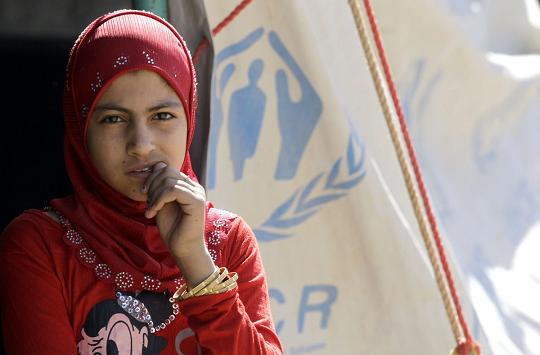AMMAN: Syrian forces killed at least five civilians and moved into a town near the Turkish border on Tuesday, activists and witnesses said, even as Turkey’s foreign minister pressed President Bashar Al-Assad to halt assaults on protests against his rule.
The anti-Assad Syrian Revolution Coordinating Union said two sisters, aged 6 and 11, were among five bodies brought to a hospital in the town of Tibet Al-Imam after military raids on villages around the besieged city of Hama.
Despite growing international condemnation, including a sudden wave of Arab criticism, Assad’s forces also continued an offensive in the eastern city of Deir Al-Zor.
Turkish Foreign Minister Ahmet Davutoglu met Assad to press for a halt to the crackdown in which activists say at least 1,600 civilians have died, making it one of the bloodiest of the upheavals sweeping the Arab world.
Neighbouring Turkey has grown increasingly critical of the violence but earned a sharp rebuke on Sunday when an Assad adviser said Syria would not accept interference in its affairs.
US Secretary of State Hillary Clinton had asked Davutoglu to reinforce a demand from Washington that Syria return the army to barracks immediately and release prisoners.
Syria has faced nearly five months of protests against Assad’s 11-year rule, inspired by Arab revolts which overthrew leaders in Egypt and Tunisia earlier this year.
Last week Assad sent troops and tanks to quell the city of mostly Sunni Muslim city of Hama in central Syria and the army launched a similar assault on Sunday against Deir Al-Zor.
Witnesses said armoured vehicles entered the town of Binnish, 30 km (20 miles) from the Turkish border, at dawn on Tuesday. "The whole town has been joining in night rallies (against Assad) after Ramadan prayers," a resident said.
An armoured column also pushed towards the centre of Deir Al-Zor, with troops storming houses and making arrests on the third day of an offensive on the provincial capital of an oil region bordering Iraq’s Sunni heartland, a resident said.
"They are now about one kilometre from downtown. When they finish with one district, they move to another," said the resident, who gave his name as Iyad.
Growing isolation
Turkish Prime Minister Tayyip Erdogan has described Syria’s uprising as a domestic issue for Turkey, because of their 850 km (530 mile) shared border.
Increasing the pressure on Assad, Sunni Muslim power Saudi Arabia issued a blunt warning that he risked turmoil unless he stopped the bloodshed and adopted reforms. Kuwait and Bahrain followed the kingdom in recalling their ambassadors.
The withdrawal of envoys left Assad with few diplomatic friends bar Iran. Western states have imposed sanctions on his top officials, while states with close ties to Damascus such as Russia and Turkey have warned Assad he is running out of time.
Nevertheless, no country has proposed military action such as that launched against Libya’s leader Muammar Gaddafi.
In Deir Al-Zor, a resident said on Monday 65 people had been killed since tanks and armoured vehicles barrelled into the city, 400 km (250 miles) northeast of Damascus on Sunday.
The British-based Syrian Observatory of Human Rights said among the dead were a mother and her two children, an elderly woman and a girl. Syria has expelled most independent media since the revolt began, making it hard to confirm accounts.
Syrian authorities have denied that any Deir Al-Zor assault took place.
The official state news agency said "not a single tank has entered Deir Al-Zor" and reports of tanks in the city were "the work of provocateur satellite channels".
The authorities say they have faced attacks since the protests erupted in March, blaming armed saboteurs for civilian deaths and accusing them of killing 500 security personnel.
State television broadcast footage on Sunday of mutilated bodies floating in the Orontes river in Hama, saying 17 police had been ambushed and killed in the central Syrian city.
The official SANA news agency said on Monday the military was starting to pull out of Hama after it said they had helped restore order. Residents said there were still tanks in parts of the city and security forces were making arrests.
About 1,500 people were detained in Hama’s Jarajima district and troops killed three civilians, the Observatory said.
Activists say at least 130 people were killed in Hama, where Assad’s father crushed an armed Islamist uprising in 1982, and one group has put the death toll at over 300.
Like most of Syria, ruled by Assad’s minority Alawite family, Hama and Deir Al-Zor are mainly Sunni cities, and the crackdowns there resonate with Sunnis, who form the majority in the region and govern most Arab countries.


